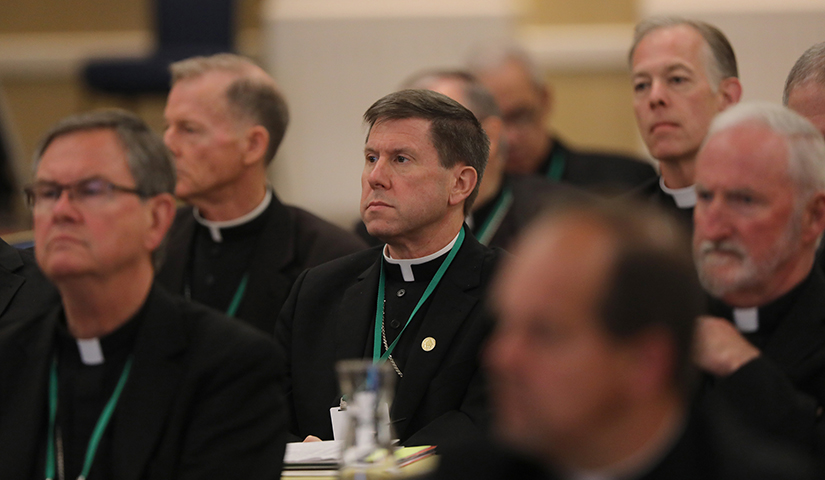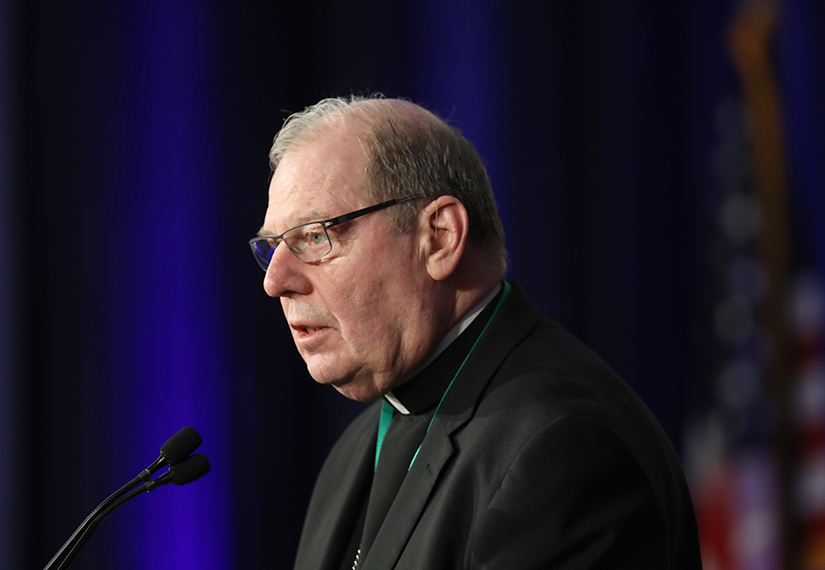See updates from the USCCB spring general assembly, including a live stream, here.
BALTIMORE -- The U.S. bishops are set to vote on a 10-point statement, "Affirming Our Episcopal Commitments," in which the bishops hope to regain "the trust of the people of God."
The vote on the document is expected June 13, the final day of the U.S. bishops' June 11-13 spring general assembly in Baltimore. They received a preliminary presentation on it June 11.
The bishops were scheduled to discuss the statement at last November's general meeting, but a vote was put on hold after the Vatican asked the bishops to not pass any proposals regarding clerical sexual abuse until it had had sufficient time to review those proposals.
In 2002, the bishops approved a "Statement of Episcopal Commitment," in which they declared that the provisions of the "Charter for the Protection of Children and Young People" applied to them as well.
But a stronger response was called for after last summer's revelations of the decades-long abuses committed by Theodore McCarrick, a former cardinal who was laicized earlier this year, and the release in August of a Pennsylvania grand jury report on a months-long investigation into abuse claims against clergy and other Church workers in six Pennsylvania Catholic dioceses over a 70-year period, beginning in 1947.
 Bishop J. Mark Spalding of Nashville, Tenn., center, listened to a speaker on the first day of the spring general assembly of the U.S. Conference of Catholic Bishops in Baltimore June 11, 2019.Photo Credit: Bob Roller | Catholic News ServiceThe week before the bishops' meeting, details emerged from the Vatican-ordered investigation of former Bishop Michael J. Bransfield of Wheeling-Charleston, W. Va., spelling out a multitude of financial and sexual improprieties. Bishop Bransfield resigned last September, shortly after fresh allegations of sexual misconduct involving adults were reported against him -- the first allegations surfaced in 2012 and dated back to the 1970s, when he was a priest of the Archdiocese of Philadelphia.
Bishop J. Mark Spalding of Nashville, Tenn., center, listened to a speaker on the first day of the spring general assembly of the U.S. Conference of Catholic Bishops in Baltimore June 11, 2019.Photo Credit: Bob Roller | Catholic News ServiceThe week before the bishops' meeting, details emerged from the Vatican-ordered investigation of former Bishop Michael J. Bransfield of Wheeling-Charleston, W. Va., spelling out a multitude of financial and sexual improprieties. Bishop Bransfield resigned last September, shortly after fresh allegations of sexual misconduct involving adults were reported against him -- the first allegations surfaced in 2012 and dated back to the 1970s, when he was a priest of the Archdiocese of Philadelphia.
Archbishop William E. Lori of Baltimore, who was appointed apostolic administrator of the diocese last September, restricted Bishop Bransfield's ministry. Archbishop Lori also was charged with overseeing the investigation.
"Some bishops have failed in keeping to these promises (made at their episcopal ordination) by committing acts of sexual abuse or sexual misconduct themselves," the text of the proposed new statement states. "Others have failed by not responding morally, pastorally and effectively to allegations of abuse or misconduct perpetrated by other bishops, priests and deacons. Because of these failures, the faithful are outraged, horrified and discouraged."
The statement adds, "The anger is justified; it has humbled us, prompting us into self-examination, repentance and a desire to do better, much better. We will continue to listen."
"In his personal letter to the U.S. bishops in January 2019, Pope Francis reminded us that the consequences of our failures cannot be fixed by being administrators of new programs or new committees. They can only be resolved by humility, listening, self-examination and conversion."
The document, presented June 11 by Cardinal Joseph W. Tobin of Newark, N.J., chairman of the bishops' Committee on Clergy, Consecrated Life and Vocations, has been updated from a version mailed to bishops in May. The previous document, then titled "Acknowledging Our Episcopal Commitments," had nine points. The current version has 10.
The newest point reads: "We are also committed ... to include the counsel of lay men and women whose professional backgrounds are indispensable."
Other points in the proposed document include:
-- "We will continue to reach out to the victims/survivors of sexual abuse by the clergy and their families in support of their spiritual and emotional well-being" so they can "find the care and healing they need."
-- Pledging that the requirements of the 2002 charter "apply to bishops as well as to priests and deacons and commit to hold ourselves and, fraternally, hold our fellow bishops to comply fully with the charter's 'Statement of Episcopal Commitment.'"
-- Promote and disseminate details on how abuse can be reported to an independent third-party entity. "While safeguarding confidentiality of all persons involved, every effort will be made toward transparency and keeping the reporter appraised of the status of the case."
-- Amend if necessary diocesan codes of conduct to state "unequivocally" that they also apply to bishops.
-- "Make sure that these codes of conduct contain proper explanations as to what constitutes sexual misconduct with adults as well as what constitutes sexual harassment of adults."
-- "We will be always mindful that there can be no 'double life,' no 'special circumstances,' no 'secret life' in the practice of chastity."
-- Quoting from the 2004 Vatican directory for the pastoral ministry of bishops, "Apostolorum Successores," and Pope Francis' May "motu proprio," titled "Vos Estis Lux Mundi" ("You are the light of the world"), "our first response will be to provide for the pastoral care of the person who is making the allegation, as well as follow the established church and civil procedures to investigation. This will be done in cooperation with lay experts and civil authorities."
-- Participate in gatherings "in regard to best practices in dealing with sexual abuse of minors, and sexual misconduct with or sexual harassment of adults."
-- When proposing names of potential future bishops, "we will offer candidates truly suitable for the episcopacy."
Proposed protocol outlines restrictions on bishops facing claim of abuse
 Bishop Robert P. Deeley of Portland, Maine, spoke on the first day of the spring general assembly of the U.S. Conference of Catholic Bishops in Baltimore June 11, 2019. Photo Credit: Bob Roller | Catholic News ServiceBALTIMORE -- If a credible accusation of sexual misconduct has been reported against a retired bishop, his successor may act to limit the retired bishop's scope of ministry, including the celebration of the sacraments and the right to be buried in the diocesan cathedral, according to a proposed document presented to the bishops the first day of their June 11-13 spring general assembly in Baltimore.
Bishop Robert P. Deeley of Portland, Maine, spoke on the first day of the spring general assembly of the U.S. Conference of Catholic Bishops in Baltimore June 11, 2019. Photo Credit: Bob Roller | Catholic News ServiceBALTIMORE -- If a credible accusation of sexual misconduct has been reported against a retired bishop, his successor may act to limit the retired bishop's scope of ministry, including the celebration of the sacraments and the right to be buried in the diocesan cathedral, according to a proposed document presented to the bishops the first day of their June 11-13 spring general assembly in Baltimore.
The "Protocol Regarding Available Non-Penal Restrictions on Bishops" was scheduled to be voted on when the bishops met last November. However, the Vatican requested they delay a vote until after the Vatican held a February meeting for presidents of bishops' conferences worldwide to discuss the abuse crisis.
The U.S. Conference of Catholic Bishops' Administrative Committee had decided last September that the development of a such a protocol would be helpful, said Bishop Robert P. Deeley of Portland, Maine, chairman of the bishops' Committee on Canonical Affairs and Church Governance. With the delay of any possible vote on the document last fall, bishops had more time to offer suggestions on the document.
"The authority to impose penalties on bishops who have committed offensive acts by commission or omission rests solely with the supreme pontiff," Bishop Deeley reminded his fellow bishops. But there are "existing instruments in canon law that are available to a diocesan bishop for imposing limitations."
Those restrictions can include "a statement to the effect that the bishop emeritus does not represent the diocese in any fashion or act on its behalf, and he is not to make public statements about alleged offenses, since these could result in further harm to victims or be detrimental to the faithful."
A diocesan bishop may forbid a retired bishop to preach, which is any clergyman's canonical right. "The diocesan bishop concerned may also request that the Apostolic See extend this prohibition more broadly or deny the exercise of the right entirely," the proposed document says.
Diocesan bishops also may strip a retired bishop of the right to confer the sacrament of confirmation or to hear confessions. "The bishop emeritus can be denied the delegation necessary to witness marriages," it adds. "The diocesan bishop may request of the bishop emeritus, in writing, that he refrain from the public celebration of other sacraments or rites of the church."
While the U.S bishops, in their "Directory for the Pastoral Ministry of Bishops," state that retired bishops have the right to sustenance and retirement benefits, "the diocesan bishop may adjust the benefits given to a bishop emeritus who falls under this protocol," the proposed document said. "For instance, the diocesan bishop may decide that no funding for travel or secretarial assistance needs to be provided."
As for the possibility of burial in the diocesan cathedral, "the diocesan bishop will prudently decide based on local circumstances whether the bishop emeritus will be buried in the cathedral church of if other arrangements should be made."
The proposed protocol is scheduled to be voted on June 13, with bishops able to submit amendments until the end of their June 12 session. To be approved, the document requires a yes vote by two-thirds of all members of the USCCB.